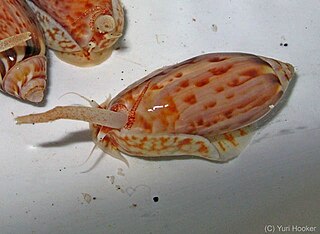
A snail is, in loose terms, a shelled gastropod. The name is most often applied to land snails, terrestrial pulmonate gastropod molluscs. However, the common name snail is also used for most of the members of the molluscan class Gastropoda that have a coiled shell that is large enough for the animal to retract completely into. When the word "snail" is used in this most general sense, it includes not just land snails but also numerous species of sea snails and freshwater snails. Gastropods that naturally lack a shell, or have only an internal shell, are mostly called slugs, and land snails that have only a very small shell are often called semi-slugs.

The gastropods, more commonly known as snails and slugs, belong to a large taxonomic class of invertebrates within the phylum Mollusca, called Gastropoda. This class comprises snails and slugs from saltwater, from freshwater, and from the land. There are many thousands of species of sea snails and slugs, as well as freshwater snails, freshwater limpets, and land snails and slugs.

Heterobranchia, the heterobranchs, is a taxonomic clade of snails and slugs, which includes marine, aquatic and terrestrial gastropod mollusks.

Whelk is a common name that is applied to various kinds of sea snail. Although a number of whelks are relatively large and are in the family Buccinidae, the word whelk is also applied to some other marine gastropod species within several families of sea snails that are not very closely related.

Captain Frederick Wollaston Hutton, FRS, was an English-New Zealand scientist who applied the theory of natural selection to explain the origins and nature of the natural history of New Zealand. An army officer in early life, he then had an academic career in geology and biology. He became one of the most able and prolific nineteenth century naturalists of New Zealand.

Cypraeoidea, the cowries and cowry allies, is a superfamily of sea snails, marine gastropods included in the clade Littorinimorpha. This superfamily had been called Cypraeacea and was named by Rafinesque in 1815.

Cone snails, cone shells, or cones are common names for a large group of small to large-sized extremely venomous predatory sea snails, marine gastropod molluscs.

Olivoidea is a taxonomic superfamily of minute to medium-large predatory sea snails, marine gastropod mollusks in the clade Neogastropoda.

Freshwater snails are gastropod mollusks which live in freshwater. There are many different families. They are found throughout the world in various habitats, ranging from ephemeral pools to the largest lakes, and from small seeps and springs to major rivers. The great majority of freshwater gastropods have a shell, with very few exceptions. Some groups of snails that live in freshwater respire using gills, whereas other groups need to reach the surface to breathe air. In addition, some are amphibious and have both gills and a lung. Most feed on algae, but many are detritivors and some are filter feeders.

Conus crotchii is a species of sea snail, a marine gastropod mollusk in the family Conidae, the cone snails and their allies.

Aphera is a genus of sea snails, marine gastropod mollusks in the family Cancellariidae, the nutmeg snails.

Calyptraea, commonly known as the Chinese hat snails is a genus of sea snails, marine gastropod mollusks in the family Calyptraeidae, a family which contains the slipper snails or slipper limpets, cup-and-saucer snails, and Chinese hat snails.

Alvania grancanariensis is a species of minute sea snail, a marine gastropod mollusk or micromollusk in the family Rissoidae.

Terrestrial molluscs or land molluscs (mollusks) are ecological group that includes all molluscs that lives on land in contrast to freshwater and marine molluscs.

Lilliconus sagei is a species of sea snail, a marine gastropod mollusk, in the family Conidae, the cone snails and their allies.
Metaconulus is an extinct genus of sea snails, marine gastropod mollusks, in the family Calliostomatidae within the superfamily Trochoidea, the top snails, turban snails and their allies.
Maurea alertae is a species of sea snail, a marine gastropod mollusk, in the family Calliostomatidae within the superfamily Trochoidea, the top snails, turban snails and their allies.
Metaconulus heres is an extinct species of sea snail, a marine gastropod mollusk, in the family Calliostomatidae within the superfamily Trochoidea, the top snails, turban snails and their allies.
Metaconulus mauliaensis is an extinct species of sea snail, a marine gastropod mollusk, in the family Calliostomatidae within the superfamily Trochoidea, the top snails, turban snails and their allies.















